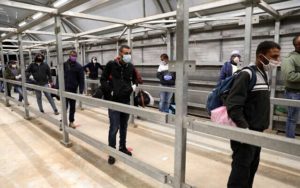Kav LaOved’s analysis: The occupation of Palestinian labor – 2024 version

Palestinian workers enter Israel through the Mitar checkpoint in Hebron, 3 May 2020
Kav LaOved reports on 7 February 2024:
Amidst the ongoing turmoil of the October 2023 war, our hearts are heavy with concern for the plight of Palestinian workers who, since the inception of this conflict, have been barred from entering Israel for work. Internally, we at Kav LaOved have deeply reflected on the evolving situation and the impact it has on these workers and their families. Our organization, dedicated to defending the rights of workers, has maintained steadfast support for Palestinian workers for over three decades. Even amidst the current challenges, we remain in close, daily contact with them.
In response to recent events, we have recognized the imperative need to take a decisive stance on the matter. Following extensive deliberation, we are unveiling our perspective, which addresses the multifaceted challenges confronting Palestinian workers during this troubled period. This document aims to illuminate their experiences, advocate for their rights, and address questions that require answers in order find solutions to mitigate the suffering induced by their deprivation from livelihoods in Israel.
Our perspective analysis delves into the employment dynamics of Palestinian workers in Israel, aiming to stimulate a discourse that is free from solely security-oriented considerations. We believe it is crucial to promote substantive discussion on the issue of employment in Israel without recourse to security considerations. Broadening the understanding of the measures implemented by the Israeli government concerning the Palestinian working population is vital, in our view. This approach ensures that any discourse is grounded in factual information and data. Furthermore, it empowers us to demand answers from the Israeli government regarding critical inquiries and to hold the government accountable for the distress experienced by hundreds of thousands of Palestinian families, stemming from a series of collective punishments that extend beyond wartime measures.
The profile of Palestinian workers from the West Bank reveals a significant presence of individuals from the Palestinian middle class. This group comprises skilled workers who bridge the wage disparities between Israel and the West Bank, often supporting not only their immediate families but also their extended relatives, including parents, unmarried siblings, and grandchildren. In times of crisis, such as during the current war, the uncertainty about future livelihoods weighs heavily on these workers and their families. One might wonder: How does the economic reliance of Palestinian workers in Israel on supporting not only their immediate families but also their extended relatives impact their financial stability and social dynamics within their communities back home in the West Bank?
Kav LaOved’s records and observations reveal that constant threat of job instability and potential loss carries profound implications beyond mere financial stability. It significantly affects their overall sense of dignity and self-worth, as they grapple with the uncertainty of being able to provide for their families and fulfill their roles as providers and caregivers. This uncertainty can lead to heightened stress, anxiety, and feelings of inadequacy, impacting their mental health and well-being.
